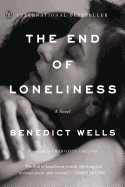
Not since Patrick Modiano's excellent The Black Notebook has a novel so deftly probed memory and longing, the losses of childhood and the pain of loving as Benedict Wells's The End of Loneliness, translated from the German by Charlotte Collins. Jules, the youngest of three siblings, struggles with isolation and loss after his parents are killed in a car accident and he is sent to boarding school. Of his parents, Jules says, "My father had moved [to France] when he finished school because he wanted to escape his family. My mother had moved there because she loved France. (And because she wanted to escape her family)." But he could be saying the same for himself and his siblings. They will spend the next few decades attempting to escape their family legacy and, at times, each other.
Jules's internal life and his complex relationship with Alva, a fellow boarding school student, are superbly crafted, as are his observations about his siblings, who have the same depth and individuality.
Additionally, there is a beguiling and tragic uncertainty: Jules is unable fully to reconstruct or reinterpret a childhood devoured by relentless time and is unable fully to know or understand distant Alva and his lost parents. His sister, who has struggled with both with her beauty and her restlessness, remarks, "Everything's over so quickly and you can't hold on to anything. All you can do is be." For Jules, neither life nor Alva can be pinned down; both can only be fleetingly experienced. --Evan M. Anderson, collection development librarian, Kirkendall Public Library, Ankeny, Iowa

